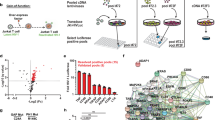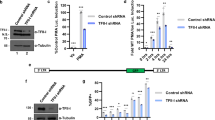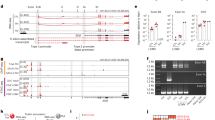Abstract
Human immunodeficiency virus (HIV) production from latently infected T lymphocytes can be induced with compounds that activate the cells to secrete lymphokines1,2. The elements in the HIV genome which control activation are not known but expression might be regulated through a variety of DNA elements. The cis-acting control elements of the viral genome are enhancer and promoter regions. The virus also encodes trans-acting factors specified by the tat-III (refs 3-6) and art genes7. We have examined whether products specific to activated T cells might stimulate viral transcription by binding to regions on viral DNA. Activation of T cells, which increases HIV expression up to 50-fold, correlated with induction of a DNA binding protein indistinguishable from a recognized transcription factor, called NF-κB (ref. 8), with binding sites in the viral enhancer. Mutation of these binding sites abolished inducibility. That NF-κB acts in synergy with the viral tat-III gene product to enhance HIV expression in T cells may have implications for the pathogenesis of AIDS (acquired immune deficiency syndrome).
This is a preview of subscription content, access via your institution
Access options
Subscribe to this journal
Receive 51 print issues and online access
$199.00 per year
only $3.90 per issue
Buy this article
- Purchase on Springer Link
- Instant access to full article PDF
Prices may be subject to local taxes which are calculated during checkout
Similar content being viewed by others
References
Zagury, D. et al. Science 231, 850–853 (1986).
Harada, S. et al. Virology 154, 249–258 (1986).
Sodroski, J., Rosen, C. & Haseltine, W. Science 227, 171–173 (1985).
Arya, S., Guo, C., Josephs, S. & Wong-Staal, F. Science 229, 69–73 (1985).
Sodroski, J., Patarca, R., Rosen, C., Wong-Staal, F. & Haseltine, W. Science 229, 74–77 (1985).
Sodroski, J. et al. Nature 321, 412–417 (1986).
Rosen, C. A. et al. Nature 319, 555–559 (1986).
Sen, R. & Baltimore, D. Cell 46, 705–716 (1986).
Rosen, C. A., Sodroski, J. & Haseltine, W. A. Cell 41, 813–823 (1985).
Weiss, A. et al. J. Immun. 133, 1–7 (1984).
Muesing, M., Smith, D. H. & Capon, D. J. Cell 48, 691–701 (1987).
Fried, M. & Crothers, D. M. Nucleic Acids Res. 9, 6505–6525 (1981).
Garner, M. M. & Rezvin, A. Nucleic Acids Res. 9, 3047–3060 (1981).
Strauss, F. & Varshavsky, A. Cell 37, 889–901 (1984).
Singh, H., Sen, R., Baltimore, D. & Sharp, P. Nature 319, 154–158 (1986).
Sen, R. & Baltimore, D. Cell 47, 921–928 (1986).
Dayton, A. et al. Cell 44, 941–947 (1986).
Greene, W. C. et al. Science 232, 877–880 (1986).
Sassone-Corsi, P., Wildeman, A. & Chambon, P. Nature 313, 458–463 (1985).
Boshart, M. et al. Cell 41, 521–530 (1985).
Imbra, R. & Karin, M. Nature 323, 555–557 (1986).
Mosca, J. D. et al. Nature 325, 67–70 (1987).
Gendelman, H. E. et al. Proc. natn. Acad. Sci. U.S.A. 83, 9759–9763 (1986).
Cullen, B. R. Cell 46, 973–982 (1986).
Feinberg, M. et al. Cell 46, 807–817 (1986).
Okamota, T. & Wong-Staal, F. Cell 47, 29–35 (1986).
Jones, K. A., Kodonaga, J. T., Luciw, P. A. & Tjian, R. Science 232, 755–759 (1986).
Maniatis, T., Fritsch, E. F. & Sambrook, J. Molecular Cloning, a Laboratory Manual (Cold Spring Harbor Laboratory, New York, 1982).
Grunstein, M. & Hogness, D. Proc. natn. Acad. Sci. U.S.A. 72, 3961–3965 (1975).
Smith, G. & Summers, M. D. Analyt. Biochem. 109, 123–129 (1980).
Maxam, A. M. & Gilbert, W. Proc. natn. Acad. Sci. U.S.A. 74, 560–564 (1977).
Queen, C. & Baltimore, D. Cell 33, 741–748 (1983).
Gorman, C. M., Moffat, L. F. & Howard, B. H. Molec. cell. Biol. 2, 1044–1051 (1982).
Hall, C., Jacob, P. E., Ringold, G. & Lee, F. J. Molec. appl. Genet. 2, 101–109 (1983).
Dignam, J. D., Lebowitz, R. M. & Roeder, R. G. Nucleic Acids Res. 11, 1475–1489 (1983).
Author information
Authors and Affiliations
Rights and permissions
About this article
Cite this article
Nabel, G., Baltimore, D. An inducible transcription factor activates expression of human immunodeficiency virus in T cells. Nature 326, 711–713 (1987). https://doi.org/10.1038/326711a0
Received:
Accepted:
Issue Date:
DOI: https://doi.org/10.1038/326711a0
This article is cited by
-
Development trends of immune activation during HIV infection in recent three decades: a bibliometric analysis based on CiteSpace
Archives of Microbiology (2023)
-
HIV silencing and cell survival signatures in infected T cell reservoirs
Nature (2023)
-
Engaging innate immunity in HIV-1 cure strategies
Nature Reviews Immunology (2022)
-
RNA-induced epigenetic silencing inhibits HIV-1 reactivation from latency
Retrovirology (2018)
-
What do we measure when we measure cell-associated HIV RNA
Retrovirology (2018)
Comments
By submitting a comment you agree to abide by our Terms and Community Guidelines. If you find something abusive or that does not comply with our terms or guidelines please flag it as inappropriate.



